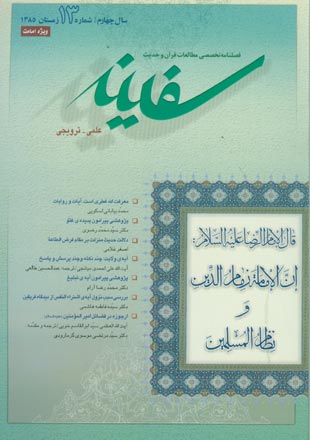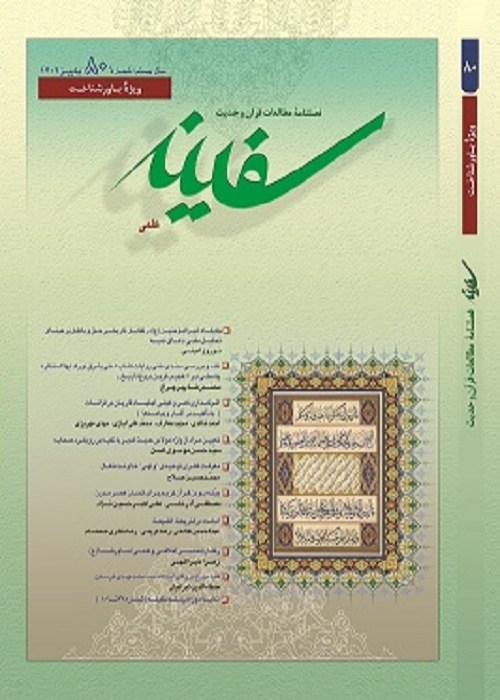فهرست مطالب

نشریه سفینه
پیاپی 13 (زمستان 1385)
- ویژه امامت
- 210 صفحه،
- تاریخ انتشار: 1385/11/28
- تعداد عناوین: 12
-
-
صفحه 3
- مقالات
-
معرفه الله فطری است: آیات و روایاتصفحه 13نویسنده در این گفتار، به تفسیر آیات قرآن در موضوع فطری بودن معرفه الله پرداخته و با استناد به احادیث و روایات اهل بیت و اقوال اندیشمندان بیان می دارد که معرفت خدای تعالی فطری بشر و فطری همه ی موجودات است. وی واژه ی فطر و فطرت را از دیدگاه اهل لغت بررسی و موارد استعمال آن را ذکر کرده است. انسان، معرفت خدا را به صورت فطری به همراه دارد و در اثر غفلت و فراموشی...
کلیدواژگان: فطرت، واژه، معرفت فطری، معرفت خدا، فطری بودن، معرفت فطری، آیات قرآن، معرفت فطری، حدیث، معرفت فطری -
صفحه 41نویسنده در این مقاله، به بررسی غلو و جریان غالی گیری پرداخته، سابقه ی غلو را در اعتقادات یهود و مسیحیت جست و جو کرده، نقطه ی آغازین غلو در اسلام را در دوره زمانی عبدالله بن سبا و دوره غیبت صغرا بررسی و جریان غالی گری را در این دو دوره با ذکر دلایل پیدایش و رواج غالی گری توضیح داده است. وی به برخی اعتقادات غلات هم چون الوهیت و نبوت ائمه علم غیب ذاتی امام تفویض تناسخ و تشبیه اشاره می کند...
کلیدواژگان: غلو، بررسی تاریخی، غلو و غالی گری، غلات، اعتقادات، غلات، نقد و تفسیر، غلات، موضع گیری امامان معصوم، الوهیت ائمه، نبوت ائمه -
صفحه 67حدیث منزلت، از احادیث متواتر است که در کتب معتبر روایی شیعه و عامه نقل شده است. نویسنده در این مقاله، ابتدا مضمون برخی از احادیث شیعه را ذکر کرده که منزلت امیرالمومنین علی (ع) نزد پیامبر را همانند هارون نزد موسی می داند و در ادامه، به ارتباط آن با مقام فرض الطاعه امام می پردازد. نویسنده خلافت را به عنوان یکی از شوون منزلت برشمرده و معنای خلیفه را به لحاظ لغت و روایات اهل بیت بررسی کرده...
کلیدواژگان: حدیث منزلت، امامت و ولایت، امیرالمومنین علی (ع)، امام معصوم، مقام فرض الطاعه، خلافت، خلافت، معنی لغوی - بخش ویژه
-
صفحه 93نویسنده در این گفتار، ابتدا هفت نکته درباره آیه ولایت مطرح می کند و سپس به ده پرسش درباره این آیه پاسخ می گوید. در این مقاله، علاوه بر بحث لغوی و عقلی و قرآنی، روایات شیعه و سنی و نیز دیدگاه های برخی از مفسران و متکلمان شیعه و سنی مورد بحث قرار می گیرد. محور اصلی مقاله، اثبات این نکته است که آیه ولایت در مورد امام علی بن ابی طالب نازل شده است و شان نزول های دیگر...
کلیدواژگان: امامت، مبنای قرآنی، آیه ولایت، آیه ولایت، روایات، امامت، احادیث شیعه و سنی، امامت، دیدگاه های مفسران، ولایت، معنای لغوی -
صفحه 127نویسنده در این نوشتار، آیه ی تبلیغ را با توجه به تفاسیر شیعه و سنی، تفسیر کرده و ضمن استناد به احادیث و روایات، ارتباط آن را با ولایت و امامت امیرالمومنین علی (ع) بیان می کند. نیز، به بررسی جوانب مختلف دلالت آیه تبلیغ و شان نزول آن می پردازد. نویسنده ارتباط این آیه را با آیات قبل و بعد که درباره اهل کتاب است در قالب چند پرسش و پاسخ توضیح داده است.
کلیدواژگان: آیه تبلیغ، ولایت و امامت امیرالمومنین علی (ع)، ابلاغ رسالت، آیه تبلیغ، شان نزول، آیه تبلیغ، پرسش و پاسخ، غدیر خم -
صفحه 143در سبب نزول آیه اشترا نفس دو نوع از روایات مطرح است: 1- روایاتی که سبب نزول آیه را در شان امیرالمومنین علی (ع) و در لیله المبیت ذکر کرده است. این روایات در کتب روایی شیعه و سنی به گونه ی متواتر، نقل شده است 2- روایاتی که سبب نزول آیه را در شان برخی صحابه هم چون صهیب و ابوذر، یاد می کند. نویسنده ضمن بیان نمونه هایی از روایات هر دو گروه، به بررسی روایات گروه دوم پرداخته...
کلیدواژگان: آیه اشترا النفس، لیله المبیت، امیرالمومنین(ع)، فضایل، آیه اشترا النفس، شان نزول - گزارش و معرفی
- اسناد و متون
-
صفحه 163ارجوزه قصیده ای است بر وزن رجز که از قدیم ترین اوزان شعر عربی است. ارجوزه ی مرحوم آیت الله العظمی خویی از نوع رجز سالم مسدس همانند الفیه ی ابن مالک در نحو است که در 166 بیت به بیان فضایل امیرالمومنین علی (ع) پرداخته است. شرح این ارجوزه نیز در کتابی 3 جلدی با عنوان علی امام البرره منتشر شده است. برتری پیامبر بر سایر پیامبران، برتری قرآن بر کتب آسمانی خاتمیت پیامبر حدیث...
کلیدواژگان: ارجوزه، خاتمیت، حدیث یوم الانذار، امامت و ولایت امیرالمومنین، امیرالمومنین علی (ع)، فضایل، حسن بن علی، فضایل، حسین بن علی - بازتاب
-
صفحه 193
-
صفحه 201
-
صفحه 1
-
the knowledge about God is innate: the related traditions and versesPage 13the author, in this essey, explains the verses of Quran about the intrinsic and innate nature of the man's knowledge about God, and by narrating the traditions of Ahle-Bait, and the words of the thinkers, shows that the knowledge about the Almighty God is innate and natural for human and other beings.Then the application and differences in application of the words "innate" and "nature" in lexicon and terminology are explained.The mankind has knowledge about God as an innate quality. He (she) may actually lose it du to carelessness and neglect. However, under the light of the educations and rememberance of the prophets and Imams, they will again, get it. Moreover in difficulties or happy exents he will find and observe the knowledge about God more than before.
-
Page 41In this research, the author has studied the exaggeration in the position of the holy Imams and worship them as (manifestation of) the Almighty God by some groups in the Shia communities.He has shown that such a belief is rooted in judism and christianity. It appeared in the Islamic community during the time of Abdullah Ibne Saba', and specially during the time of "Short Absence" of the 12th Imam. Then the reasons and causes of appearance and development of exaggeration and worship of the holy Imams are studied.The principal belief of the exaggerators such as the diety and / or prophethood of the Imam, the unlimited independent knowledge of the Imams, assimilation and deformation (change of a man in to an animal) of some mankind are discussed.At last, the clear viewpoints of the holy Imams of Shia, wich have been expressed in their traditions are given and the faith of "exaggeration" is proved as false and deviated.
-
Page 93the respected author, first provides 7 points about the values and characteristics of the verse Vilayat (5: 55) and then answers 10 questions about this subject. In addition to literal, logical, and Quranic discussions, he talks about the Shia and Sunni traditions, and views of some Shia and Sunni scholars and speakers.The main point of this article is to show that the verse of Vilayat was descended about Imam Ali (p.b.u.h), and the other justifications are not acceptable.
-
Page 127In this essay, the verse of "introduction" and "deliverence" is explained according to Shia and Sunni commentaries. Meantime, by relying on the traditions, relation with the divine leaderahip (Imamat) of Amirul-Momenin Ali (p.b.u.h), is announced, different aspects of its characteristics (time, and cause of descendence) are studied.Then, the author, has explained the relation between this verse and its previous and next verses, that talk about the people of Book, in the form of questions and answers.
-
Page 143There are two groups of traditons which talk about the cause of descend of the Quranic verse, "and from among the mankind there is a man who sells his life in order to obtain the God's approval and satisfaction; and God is Gentle with (His) servants". (2: 207)1. Very frequent and numerous traditions in the reliable Shia and Sunni collections of traditions attribute the cause of descend of this verse to the dignity and value of the act of Amirul- Momenin, when he slept in the bed of the holy Prophet, in order to prevent the murder plan of the Mecca disbelieving groups and tribes.2. Those traditions that attribute the descend of the said verse to other companions of the holy Prophet such as AbuZarr and Sohaib.The writer brings some of the traditions from both groups Then she attends the traditions of the second groups, and shows that the text and,documentation- quotation- of those tradition are false and changed.At last, she coucludes that those traditions have been fabricated by the disbelievers, in order to neglect and undervalue the qualities and preferences of the members of the holy family of the Prophet, especially the unique preferences of Amirul Momenin Ali (p.b.u.h)


